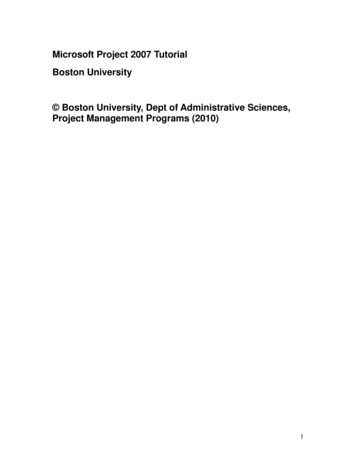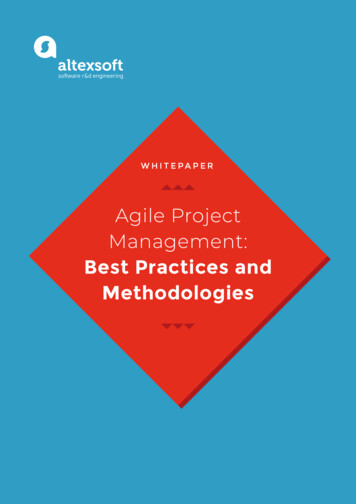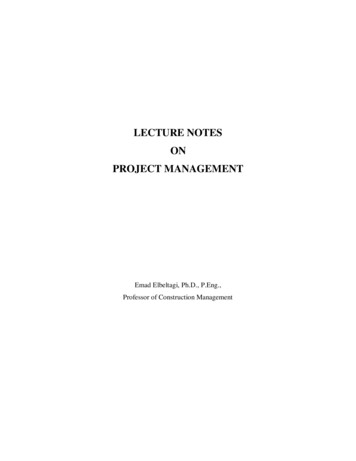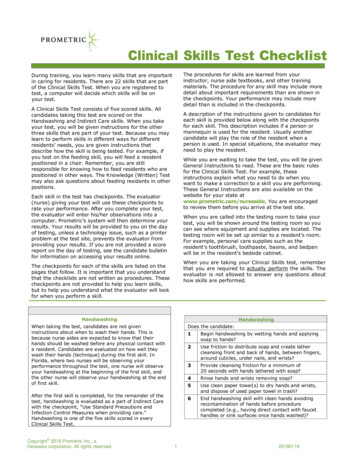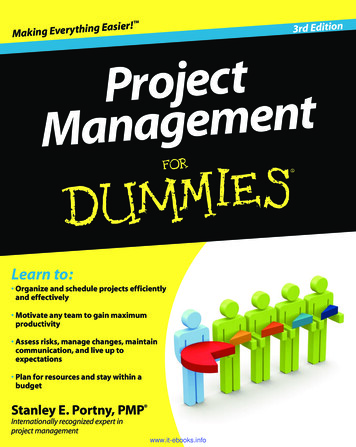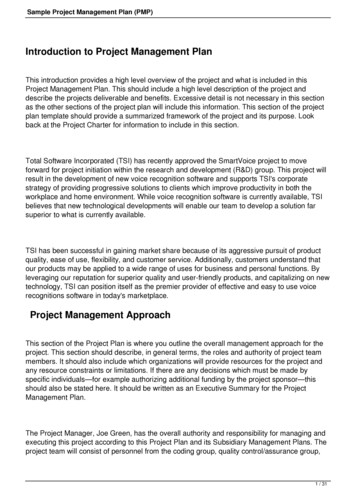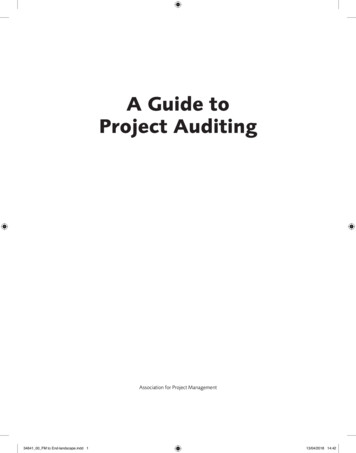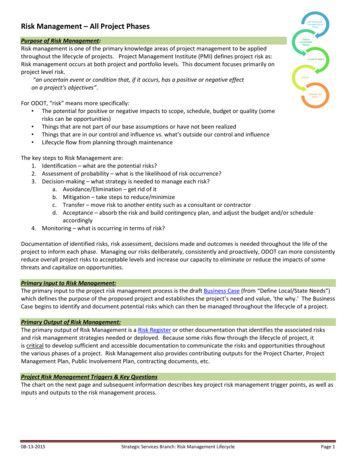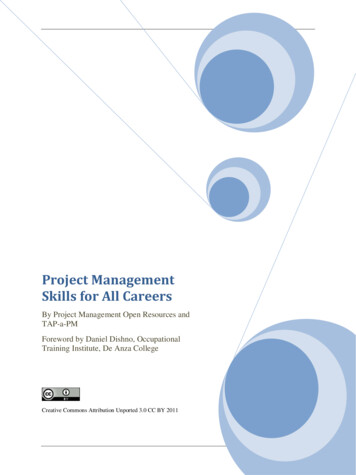
Transcription
Project ManagementSkills for All CareersBy Project Management Open Resources andTAP-a-PMForeword by Daniel Dishno, OccupationalTraining Institute, De Anza CollegeCreative Commons Attribution Unported 3.0 CC BY 2011
Copyright 2011, 2012 by Project Management Open Resources and TAP-a-PMEdition 2 January, 2012Creative Commons Attribution 3.0 Unported (CC BY 3.0)Bound BookISBN-10: 0984813802ISBN-13: 978-0-9848138-0-3e bookISBN-10: 0984813810ISBN-13: 978-0-9848138-1-0Based on Project Management for Scientists and Engineers byMerrie Barron and Andrew ant contributions from the following sourcesMaura Irene Jones, Career Descriptions in Chapter 1Several photographs Copyright 2011 by Maura Irene JonesCreative Commons Attribution 3.0 CC BYAttribution URL http://www.linkedin.com/in/maurajonesRandy Fisher, Chapter 12(a subset of Organization Management and Development at http://wikieducator.org/OMD/Culture PM)Rekha Raman, Microsoft Word template and formattingAli Daimee, syllabus and moreMike Milos, syllabusShuly Cooper, reviewsBob Sawyer, Project Manager for the Saylor Foundation proposalVictor Cesena, Project Manager for the bound textbookJim Huether, Program ManagerJacky Hood, Managing EditorSee Appendix C for references used in the Barron & Barron book and in this book.
Author and Editor BiosProject Management Open Resources (PMOR) is an organization dedicated tocreating, publicizing, and distributing open-licensed project management information. PMOR‘scommunity includes over 60 members, many with extensive project management experience andcertifications. See p-a-PM is a cooperative association of project and program managers founded inFebruary of 2008 that acts as a source of accomplished program and project managers with fullproject life-cycle skills across a set of disciplines and industries. The association supports itsmembers with a wealth of domain expertise and connections into the wider project and programmanagement community. Tap-a-PM members include highly-qualified project and programmanagers with over 200 years of project/program management experience with backgrounds insoftware, computers, electronics, IT, on-line learning, instrumentation, telecom, bio-tech, andmore. See http://www.tapapm.org/.Professor Andrew Barron co-authored Project Management for Scientists andEngineers. He is the Charles W. Duncan, Jr. – Welch Chair of Chemistry, a Professor ofMaterials Science, and the Associate Dean for Industry Interactions and Technology Transfer atRice University. See D 585.Merrie Barron, a Project Management Professional and Certified Scrum Master, coauthored Project Management for Scientists and Engineers. She teaches project management forscience and engineering at Rice University. See http://www.linkedin.com/in/merriephinney.Victor Cesena is a Project Management Professional (PMP) and Certified Scrum Master(CSM). His extensive project management experience includes stints at Electronics for Imaging,Read-Rite, Sumitomo, Hitachi Metals, Tri-media, Kennedy, Eikon, and Ampex. Victor holds anElectrical Engineering degree from the University of the Pacific.Shuly Cooper is president of PhytoScience, Inc. She has extensive experience insoftware quality engineering at companies including Verano, Spyglass, Space Systems Loral,Micro Focus, and Sybase. Shuly holds a Masters in Biochemistry from the Hebrew Universityand a PhD in Biophysics from the Weizmann Institute of Science.Ali Daimee recently completed certification in program management at the University ofCalifornia at Santa Cruz. He has taught project management at the University of California –Irvine, and Northwestern Pacific University. In his career Ali has worked for companies such asBroadcom, Sega, Sun, Oracle, Tandem, Compaq, Novell, Novellus, Cadence, Nortel, ControlData, Honeywell, and ICL. He has also co-founded startup companies managing development ofweb and network application products. Ali holds honors degrees in Mathematics and ElectricalEngineering from London University.Madhurika Dev, a project management consultant, has a track record of successfullymanaging software development projects through all phases of the project lifecycle. She hasworked for FieldDay Solutions, Sourcecorp HealthServe, Cisco, HP and Sabre. Madhurika holdsan MS in Mathematics from the University of Texas at Arlington.Page 3 of 135
Randy Fisher holds certifications in advanced technology management and instructionaldesign. He is the Manager of Community Service Learning at the University of Ottawa‘s Centrefor Global and Community Engagement. He has made significant contributions to theCommunity College Consortium for Open Education Resources, the Commonwealth ofLearning, the OER Foundation and WikiEducator. Randy holds an MA in OrganizationManagement and Development and a post-graduate degree in Journalism,Jacky Hood is a program manager, service/support executive, management consultant,and educator. Prior to serving as Director of College Open Textbooks, her clients includedApple, HP, IBM, RightWave, and Slam Dunk Networks. She has published four books andnumerous articles, and won writing awards from McGraw-Hill and Patton Consultants. Jackyholds a Masters of Systems Engineering from Carleton University, Ottawa, and a Bachelorsdegree in Electrical Engineering from the University of Nebraska.Jim Huether, a Certified Scrum Master, has served as Program/Project Manager forcompanies such as Philips Semiconductors, Logitech, and Symantec, as well as Foothill Collegeand College Open Textbooks, where he led the development of several on-line courses. Jim hasalso taught several courses in project management. Prior to this, he served in softwaredevelopment management positions for a number of companies before founding Nchant, aninvention, licensing and product development company. Jim holds both a Bachelors degree and aMasters degree in Electrical Engineering from Rice University.Mike Milos is a senior consultant at Deloitte & Touche, and teaches a systemdevelopment lifecycle class at both undergraduate and graduate levels at the University ofPhoenix In the past he has worked for Hewlett-Packard, Network Appliance, KLA-Tencor, andthe US Navy. Mike holds a Masters degree in Computer Information Systems and a Bachelorsdegree in Information Technology from the University of Phoenix.Maura Jones is a Project Management Professional, and holds certifications in audit(ISACA CISA) and security (ISC2 CISSP). Maura has provided project management expertise toa variety of global clients, and taught Business Data Communications and eCommerce at theUniversity of San Francisco and Notre Dame de Namur University. Maura holds an MS inTelecommunications Management from Golden Gate University, a BS in Psychology from SanJose State University, and Certificates in Project Management from UC Berkeley and Stanford.Maura is active in professional organizations, including PMI and ITIL.Rekha Raman, a Project Management Professional, is a marketing communicationsmanager at LitePoint, responsible for a wide spectrum of documents, including datasheets, quickstart guides, user manuals, field service instructions, and regulatory documents. With over 15years of experience in technical writing, Rekha‘s interests range from effective communicationsto marine biology to wireless technology. On behalf of College Open Textbooks, she reviewedthe Project Management for Scientists and Engineers textbook.Lalit Sabnani is APICS certified and is working on his Project Management Professionalcertification. He has led large and complex development programs across a 25-year career indata storage and semiconductor technology. On behalf of College Open Textbooks, he reviewedthe Project Management for Scientists and Engineers textbook. Lalit holds an MS in IndustrialEngineering from Arizona State University and a BS in Mechanical Engineering from MSUniversity in India.Page 4 of 135
Bob Sawyer, a consultant in product management and product marketing, has worked fora wide range of technology companies, both large and small, including IBM, Solid, Panta, HP,Compaq, and Tandem. He holds a Bachelors degree from Northwestern University and a Mastersdegree from the Kellogg School of Management.Dalvinder Singh Matharu has worked as a project manager for 3 years and has been ateam member for more than 15 years. He is a Project Management Professional (PMP) and aCertified Scrum Master (CSM).Daria Hemmings holds an MA in Creative Writing from Emerson College anda Certificate in Systems Analysis from Northeastern University. She has taught FreshmanComposition at Emerson College and Craven Community College.Page 5 of 135
ForewordDaniel Dishno, Supervisor, Occupational Training Center,De Anza College, Cupertino, CA, USAEvery organization has a purpose for existing. It has a set of ongoing organized functionsand structures (aka work) that have been established to accomplish something that relates to thepurpose of the organization. At a college, instructors teach classes, counselors provide academicadvice, and administrators guide the day to day operations. This is not project management, it isongoing work. Project Management Skills for All Careers defines project management as "theapplication of knowledge, skills, tools, and techniques applied to project activities in order tomeet project requirements. Project management is a process that includes planning, putting theproject plan into action, and measuring progress and performance. Projects are unique,temporary in nature and have a definite beginning and end. Projects are completed when theproject goals are achieved. A successful project is one that meets or exceeds the expectations ofthe stakeholders."In our department at the college, we have projects. Mainly these projects originate fromgrants and contracts. In developing a grant proposal or contract, team members gather aroundand look at what is required in the grant and try and figure out how best to submit a competitiveproposal. Sometimes we are overwhelmed when we read what is expected. Sometimes we laugh,and we face our fears and proceed into the unknown. Our projects usually involve job trainingand job placement services, catering to a specified group of unemployed clients such as refugees,laid-off high tech workers, or welfare recipients. After reading Project Management Skills for AllCareers, I realized the project plan is the same as a grant proposal or contract.This is exciting stuff. We are bringing something new to the campus. A new group ofstudents that just arrived from some war-torn country training for a job, a laid-off worker retraining for a new career, a welfare mom gaining skills to be self-sufficient, a new skills trainingprogram.I read Project Management Skills for All Careers in less than one week, and I feel betterequipped in planning, implementing, measuring, changing and completing projects. This bookrefreshed my passion for my work. I am excited to have this book in my arsenal of professionalresources.Project Management Skills for All Careers offers a framework for managing projects inany career area. The concepts can be applied no matter where you work. As a matter of fact,many of our dislocated workers are trained to become certified in Project Management. Projectmanagement skills are essential and invaluable for anyone who initiates or is assigned to aproject. Project Management Skills for All Careers is a unique book, as it is current, wellorganized, a pleasure to read. It is available as an open source textbook, free to those who useand apply it in their work place.Page 6 of 135
PrefaceWhen an opportunity presents itself, we look around for people with these skills:leadership, decisiveness, scoping, identifying tasks and deliverables, defining relationshipsamong tasks, finding and assigning resources, scheduling, and budgeting. We also want softskills including building relationships, communicating with all concerned parties, and motivatingpeople to produce quality work quickly and efficiently.Similarly when confronted with a problem such as a natural disaster, many of the sameskills are required.For more than half a century, project managers have learned and applied these skills inengineering, science, construction, and more. Today‘s rapidly-changing world calls forexpanding the use of project management skills to many more industries and careers.Managing repetitive work, process management, was the norm for centuries. Agriculture,manufacturing, retail, transportation, and other endeavors remained the same for years ordecades. Those days are past. The world is moving much faster and all processes must changeoften. Changing a process is a project and it demands project management skills. No longer can abusiness manager, nurse, teacher, or any other worker assume that he or she can learn a routineand then repeat it for years.The mission of this textbook is two-fold:To provide students with project management skills they can apply in any chosenprofession.To provide instructors with an open-licensed textbook they can freely copy, moveinto a learning management system; and modify to suit their teaching style, studentdemographics, available teaching time, and more.With attribution to the original authors Merrie Barron and Andrew Barron, the ProjectManagement Open Resources community, the TAP-a-PM project/program managementcooperative, and other sources, any instructor, indeed any person or organization, may freely useand even sell the materials in this textbook. Please include the information on the copyright pagein your attribution.Our project team invites all users of this textbook to learn, have fun, and be successful intheir chosen careers.Page 7 of 135
A Word to Business School andOther InstructorsThe following syllabus is suggested for an introductory 15-week one-semester class inproject management for business school students. For shorter terms such as 12-week quarters ormulti-day workshops in industry, chapters 1-6 could be covered in a single session, and chapters17 and 18 omitted and saved for an advanced class.This textbook could also be used in many vocational programs; examples appear inChapter 1. The particular skills needed in those occupations could be addressed, e.g., schedulingand budgeting.Week/Session#1BookPart#IBookChapter#1, 2, 3, 4,526374II8, 9, 10,11, 12Topic CoveredAssignmentDefinition and characteristics ofProject; Project Management andits history; Various applicationsProject Management and itsbenefits to business; Participantsin Project Management itsbeneficiariesSkill set and expertise necessaryfor a successful Project Manager;Examples and Challenges facedby a Project Manager; Focus onInterpersonal skills – the mostimportant tool setThe Project Life Cycle and itsphases – key activities, focus, andchallenges of each phaseForm small teams of 3-5students; Brainstorm abouta specific business the teamwants to select and define aproject for your teamRecognizing stakeholders, ProjectPolitical Environment,Organizational Culture and theirimportance in Project Initiation;Types of Project ManagementCertification and their benefitsPage 8 of 135Practice interpersonal skillsamong your team membersusing role play andrecognize leadership traitsof your teamDefine key deliverables pereach phase for your teamsproject and definebeginning and end of thesephases for your projectDefine your team‘s projectenvironment, stakeholders,organizational culture,policies and initiate yourproject
Week/Session#5BookPart#IIIBookChapter#13, 146157168179181019Topic CoveredAssignmentInputs to Project Planning Phase,Factors considered during theScope planning step of ProjectPlanningSchedule Planning step – toolsand techniques – types ofschedules and theircharacteristics; Activities,dependencies, relationships,graphical presentation, tracking,etc.Resource Planning step –Defining effort, durations andtype of resources required for aproject – types of estimates, toolsused, adding information to theproject scheduleBudget Planning – Considerationof costs and tradeoffs of variousexecution options such asCompany Internal cost of doingthe project versus contracting orsubcontracting all part of theproject – developing a budget forthe projectRisk and its definition; Riskidentification process, Probabilityand impact consideration ofRisks; Developing a RiskRegister and identifying variousRisk mitigation options.Quality Planning considerations –Regulatory requirements,Industry standards, InternalPolicies and guidelines, Qualitymonitoring and control, QualityAssurance and its benefitsDevelop the scope of yourteams projectPage 9 of 135Develop a WorkBreakdown Structure foryour project, defineactivities and create a basicnetwork diagramDefine resource needed foreach activity, durationallowed and the effortrequired for your project –Update your project planwith this informationDevelop a budget for yourproject considering a mixof subcontractors andinternal resourcesIdentify Risks on yourproject, their probabilityand impact, rank them anddetermine their triggers andmitigation optionsDefine a Quality plan foryour project – considerRegulatory requirements,customer satisfaction, etc.
2315FinalTopic CoveredAssignmentCommunications Planning –Defining communicationschannels, types ofcommunications, amount ofcommunications, DefiningInterfaces with Internal andexternal stakeholders,consideration of conflicts andtheir resolution, etc.Completing the overall ProjectPlanning as the final deliverablefrom the Project Planning PhaseProject Implementation Phase andits tracking and control – Needfor replanning as and whenneeded; tools and techniques ofProject controlProject Completion and how torecognize it – various actionsinvolved in closing a project –importance of lessons learned andthe celebrationFinal review and TeampresentationsCreate a communicationsplan for your projectemploying techniqueslearned in this chapterPage 10 of 135Review your overallproject plan and optimize itas necessaryDefine change control planfor your projectIdentify closing actions foryour project and documentLessons Learned.
COMPLETE TABLE OF CONTENTSAuthor and Contributor BiosForewordPrefaceA Word to Business School and other InstructorsPART I - INTRODUCTIONChapter 1: Jump-Start Any Career with Project Management Skills1.1Careers Using Project Management Skills1.2Business Owners1.3Construction Manager1.4Creative Services1.5Educator1.6Engineers1.7Healthcare Careers1.8Paralegal1.9Software developer/computer programmer1.10Scientist TechniciansChapter 2: History of Project ManagementChapter 3: What is a Project?3.1A Formal Definition of a ProjectChapter 4: Project CharacteristicsChapter 5: What is Project Management?Chapter 6: Project Management Areas of Expertise6.1Application knowledge; standards & regulations6.2Understanding the Project Environment6.3Management Knowledge and SkillsPage 11 of 135
6.4Interpersonal SkillsChapter 7: The Project Life Cycle7.1Initiation Phase7.2Planning Phase7.3Implementation Phase7.4Closing PhasePART II – PROJECT STRATEGYChapter 8: Project Stakeholders8.1Top Management8.2The Project Team8.3Your Manager8.4Peers8.5Resource Managers8.6Internal Customer8.7External customer8.8Government8.9Contractors, subcontractors, and suppliersChapter 9: The Politics of Projects9.1Assess the environment9.2Identify goals9.3Define the problemChapter 10: Project InitiationChapter 11: Project Management Certifications11.1Project Management Institute Overview11.2Scrum Development OverviewChapter 12: Culture and Project Management12.1What is Organizational Culture?12.2Project Manager's ChecklistPage 12 of 135
12.3Project Team Challenges12.4Dealing with Conflict12.4Bibliography for Chapter 12PART III – PROJECT PLANNINGChapter 13: Overview of Project PlanningChapter 14: Scope Planning14.1Defining the Scope14.2Project Requirements14.3Functional Requirements14.4Non-Functional Requirements14.5Technical Requirements14.6User Requirements14.7Business Requirement14.8Regulatory requirements14.9An Example of RequirementsChapter 15: Project Schedule Planning15.1Preparing the work breakdown structure15.2A case study15.3Activity Definition15.4Leads and Lags15.4Milestones15.5The Activity Sequencing Process15.6Creating the Network DiagramChapter 16: Resource Planning16.1Estimating the Resources16.2Estimating Activity Durations16.3Project ScheduleChapter 17: Budget PlanningPage 13 of 135
17.1Make or Buy Analysis17.2Contract TypesChapter 18: Risk Management PlanningChapter 19: Quality Planning19.1Quality planning toolChapter 20: Communication PlanningChapter 21: Bringing it all togetherPart IV - IMPLEMENTATION and CLOSINGChapter 22: Project Implementation Overview22.1Change controlChapter 23: Project Completion23.1Lessons learned23.2Contract closure23.3Releasing project team23.4Celebrate!Appendix A: Solutions to ExercisesSolution to Exercise 10.1Solution to Exercise 15Solutions to Exercises in Chapter 16Appendix B: Glossary of Project Management TermsAppendix C: Attributions and BibliographyPage 14 of 135
IPARTPART I - INTRODUCTIONNew Moon Copyright TallPomlin CC 0/sizes/m/in/photostream/Page 15 of 135
Chapter 1: Jump-Start Any Career with Project ManagementSkills1.1Careers Using Project Management Skills:Skills learned by your exposure to studying project management can be used in mostcareers as well as in your daily life. Strong planning skills, good communication, ability toimplement a project to deliver the product or service while also monitoring for risks andmanaging the resources, will provide an edge towards your success. Project Managers can beseen in many industry sectors including: Agriculture and Natural Resources; Arts, Media andEntertainment; Building Trades and Construction; Energy and Utilities; Engineering and Design;Fashion and Interiors; Finance and Business; Health and Human Services; Hospitality, Tourismand Recreation; Manufacturing and Product Development; Public and Private EducationServices; Public Services; Retail and Wholesale Trade; Transportation; and InformationTechnology.Below we explore various careers and some of the ways in which project managementknowledge can be leveraged.1.2Business OwnersBusiness owners definitely need to have some project management skills. With allsuccessful businesses, the product or service that is being delivered to the customer meets theirneeds in many ways. The product or service is of the quality desired, the costs are aligned withwhat the consumer expected, and the timeliness of that product or service meets the deadline forthe buyer of that item.Copyright 2011 by Maura Irene JonesCreative Commons Attribution 3.0 CC BYAttribution URL http://www.linkedin.com/in/maurajonesThe pillars of project management are delivering a product/service within schedule, cost,scope, and quality requirements. Business owners need planning, organizing, and scoping skillsPage 16 of 135
and the ability to analyze, communicate, budget, staff, equip, implement and deliver.Copyright 2011 by Maura Irene JonesCreative Commons Attribution 3.0 CC BYAttribution URL http://www.linkedin.com/in/maurajonesUnderstanding the finances, the operations, and the expenses of the business are amongthe skills that project managers learn and practice. Some businesses may focus more onaccounting, providing financial advice, sales, training, public relations, and actuary or logisticianroles. Business owners may own a travel agency or could provide hospitality. Business ownerscould be managing a store front or a location in their town‘s marketplace.Copyright 2011 by Maura Irene JonesCreative Commons Attribution 3.0 CC BYAttribution URL http://www.linkedin.com/in/maurajones1.2.1Example: Restaurant Owner/ManagerRestaurant Managers are responsible for the daily operations of a restaurant that preparesand serves meals and beverages to the customers. Strong planning skills, especially coordinatingPage 17 of 135
with the various departments (kitchen, dining room, banquet operations, food service managers,vendors providing the supplies) ensure that customers are satisfied with their dining experience.Managers‘ ability to recruit and retain employees, and monitor employee performance andtraining ensure quality with cost containment. Scheduling in many aspects, not only the staff butalso the timing of the food service deliveries, is critical in meeting customer expectations.Risk management is essential to ensure food safety and quality. Managers monitor ordersin the kitchen to determine where delays may occur, and they work with the chef to prevent thesedelays. Legal compliance is essential in order for the restaurant to stay open, so RestaurantManagers direct the cleaning of the dining areas and the washing of tableware, kitchen utensils,and equipment. They ensure the safety standards and legality, especially in serving alcohol.Sensitivity and strong communication skills are needed when customers have complaints oremployees feel pressured because more customers arrive than the forecast predicted.Financial knowledge is needed for the soundness of running the restaurant, especiallytracking special projects, events, and costs for the various menu selections. Catering eventssmoothly can be an outcome of using project plans and the philosophy of project management.The Restaurant Managers or the executive chef analyzes the recipes to determine food, labor, andoverhead costs, determine the portion size and nutritional content of each serving, and assignsprices to various menu items, so that supplies can be ordered and received in time.Copyright 2011 by Maura I JonesCreative Commons Attribution 3.0 CC BYAttribution URL http://www.linkedin.com/in/maurajonesPlanning is the key for successful implementation. Managers or executive chefs need toestimate food needs, place orders with distributors, and schedule the delivery of fresh food andsupplies. They also plan for routine services (equipment maintenance, pest control, wasteremoval) and deliveries including linen services or the heavy cleaning of dining rooms or kitchenequipment, to occur during slow times or when the dining room is closed. A successfulrestaurant relies on many skills that the project management profession emphasizes.Many businesses may explore outsourcing for certain services. Below is a sample statusand project plan that reflects the various tasks needed for the project. A review of finances, theimportance of communicating to stakeholders, and the importance of time, cost, schedule, scope,and quality are reflected. Many companies may use these steps in their business. These plansPage 18 of 135
show the need for the entire team to review the various proposals to choose the best plan.Sample status chart which is typical with the use of a red-yellow-greenCopyright 2011 by Maura Irene JonesCreative Commons Attribution 3.0 CC BYAttribution URL ice Sourcing 010/17November10/2410/3111/711/1411/21RFQ Task NameScope Definition:11.11.21.32Define RFQ Objectives; Draft & Approve Sourcing PlanComplete Market AnalysisKick-off RFQ Project with Key Stakeholders; EstablishBaseline & RFQ Scope w/ Key Stakeholders2.42.52.62.72.8RFQ ProcessDefine Supplier Qualifications and Identify BiddersDevelop RFQ Technical & Functional Requirements; Draft RFQDocumentDefine RFQ Evaluation Criteria & Scoring MatrixSourcing, Sponsor, LOB, and Legal Review of RFQ Document;Approval of final RFQ documentRelease RFQ Documents to BiddersHost Bidders Conference (optional)Bidders Q&A periodRFQ (Round 1) Responses due to MIJ3.13.22.12.22.3100%100%Sourcing (1) / Sponsors (2)Sourcing100%Sourcing/Key Stakeholders100%Sourcing100%100%All Key StakeholdersAll Key Stakeholders100%100%SourcingSourcingAll Key Stakeholders100%0%BiddersRound 1 MIJ Evaluation PeriodRound 1 Responses reviewed by MIJ StakeholdersRound 1 Responses are scored and Round 2 finalists selected0%0%0%All Key StakeholdersAll Key StakeholdersSourcingRound 2 MIJ Evaluation PeriodRound 2 Proposals requested from finalists and Round 2evaluation criteria finalizedRound 2 Response due to MIJRound 2 Evaluated and scored0%4.14.24.35.15.25.35.45.55.6Bidder Selection:Bidder Finalist(s) selectedContract negotiations begin with Finalist(s)Legal Review / Contract redlines (by MIJ and Finalist)Stakeholder contract review and approvalFinal Legal review and Contract approvalContract execution (signed & counter signed)345Key:MilestoneCompleteTotal # of Tasks# of taks completed% Complete0%0%0%BiddersAll Key Stakeholders0%0%0%0%0%0%All Key StakeholdersSourcingSourcingAll Key StakeholdersSourcingSourcingDecision RequiredIn progress211047.62%Sample project plan exploring outsourcing of servicesPage 19 of 135December11/2812/612/1312/2012/27
Copyright 2011 by Maura Irene JonesCreative Commons Attribution 3.0 CC BYAttribution URL on ManagerConstruction managers plan, direct, coordinate, and budget a wide variety of residential,commercial, and industrial construction projects including homes, stores, offices, roads, bridges,wastewater treatment plants, schools, and hospitals. Strong scheduling skills are essential for thisrole. Communication skills are often used in coordination of design and construction processes,teams executing the work and governance of special trades (carpentry, plumbing, electricalwiring) as well as government representatives for the permit processes.The Construction Manager may be called a project manager or project engineer. TheConstruction Manager ensures that the project gets completed on time and within budget while
advice, and administrators guide the day to day operations. This is not project management, it is ongoing work. Project Management Skills for All Careers defines project management as "the application of knowledge, skills, tools, and techniques applied to project activitie



